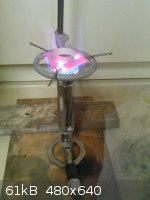White Yeti
National Hazard
   
Posts: 816
Registered: 20-7-2011
Location: Asperger's spectrum
Member Is Offline
Mood: delocalized
|
|
Sulpate reducing bacteria H2S
Hydrogen sulphide (although pungent), can be a very useful reagent for chemical synthesis. However, classic methods for making it do not allow for the
cheap generation of large amounts.
I was wondering if sulphate reducing bacteria can be used to generate this gas in large quantities. Sulphate salts can be bought cheaply in large
quantities and all that is needed is a source of energy and an anoxic environment that is low in nitrates.
Sulphate reducing bacteria need a source of energy, but which carbon containing compound can I use that the bacteria can metabolise without releasing
CO2 or CH4?
"Ja, Kalzium, das ist alles!" -Otto Loewi
|
|
|
barley81
Hazard to Others
  
Posts: 481
Registered: 9-5-2011
Member Is Offline
Mood: No Mood
|
|
A cheap method for producing hydrogen sulfide is the heating/fusion of a mixture of paraffin wax and sulfur. Carbon and hydrogen sulfide are produced.
Paraffin wax can be gotten very cheaply from candles. Buy the tealight kind. You can get 200 or so for $4. Sulfur can just be cheap garden sulfur. I
paid $10 for a 5lb bag at Lowes.
|
|
|
shannon dove
Hazard to Self
 
Posts: 77
Registered: 30-11-2011
Member Is Offline
Mood: No Mood
|
|
If you Google landfill gas, it talks about this. Some hydrogen sulphide is from decaying animal matter, but most of it comes from gypsum wall board
(calcium sulfate) in construction trash. I am far more interested in bacteria reducing phosphates to phosphine, some research says this is
possible, but it just makes a few parts per million, not really worth the effort.
|
|
|
edgecase
Hazard to Self
 
Posts: 65
Registered: 4-11-2011
Location: Ontario, Canada
Member Is Offline
Mood: Viscous
|
|
Quote: Originally posted by barley81  | | A cheap method for producing hydrogen sulfide is the heating/fusion of a mixture of paraffin wax and sulfur. Carbon and hydrogen sulfide are produced.
Paraffin wax can be gotten very cheaply from candles. Buy the tealight kind. You can get 200 or so for $4. Sulfur can just be cheap garden sulfur. I
paid $10 for a 5lb bag at Lowes. |
I tried stoichiometric amounts of CaSO4 and charcoal, both 60mesh, and "heated the bejeebers" out of it, based on the method of Fresnius, and only got
enough H2S to gas an ant. I guess I might have to cave in to the wax method, but I like the idea of producing little lumps (when mixed with plaster)
of CaS, suitable for use in a Kipps Apparatus.
Has anyone been successful at producing CaS from gypsum (waste wallboard).
[Edited on 2012-7-22 by edgecase]

|
|
|
White Yeti
National Hazard
   
Posts: 816
Registered: 20-7-2011
Location: Asperger's spectrum
Member Is Offline
Mood: delocalized
|
|
I usually make H2S by igniting aluminium and sulfur to make aluminium sulfide. Combining aluminium sulfide with water releases H2S. The problem is
that I have a very difficult time igniting the mixture and my aluminium powder is a different particle size than my sulfur powder, so the two elements
don't mix very well.
I tried the sulfur paraffin method and I got negative results. Has anyone been successful with that method? I have doubts about it because hydrogen
sulfide is flammable...
"Ja, Kalzium, das ist alles!" -Otto Loewi
|
|
|
edgecase
Hazard to Self
 
Posts: 65
Registered: 4-11-2011
Location: Ontario, Canada
Member Is Offline
Mood: Viscous
|
|
Quote: Originally posted by White Yeti  | | I usually make H2S by igniting aluminium and sulfur to make aluminium sulfide. Combining aluminium sulfide with water releases H2S.
|
What form is the product, something that could be use in a Kipps apparatus, or do you use an addition funnel with water to control gas production
rate?
|
|
|
White Yeti
National Hazard
   
Posts: 816
Registered: 20-7-2011
Location: Asperger's spectrum
Member Is Offline
Mood: delocalized
|
|
The product is usually in the form of a fused lump, much like a hard ceramic. The pieces I get are usually about the size of a small fingernail and
about the thickness of a coin. I put these lumps in a special apparatus that I leave overnight outside to avoid exposure.
"Ja, Kalzium, das ist alles!" -Otto Loewi
|
|
|